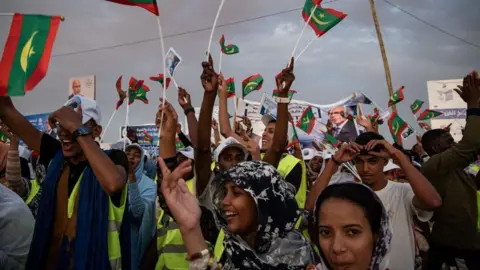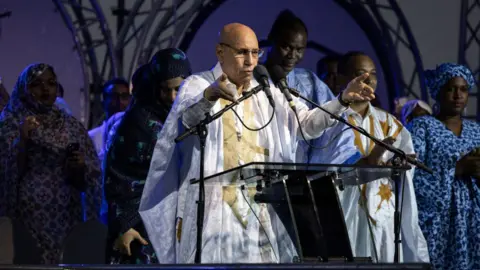Through Aaron Akinyemi and Danai Nesta Kupemba, bbc information
 AFP
AFPAs Moroccans head to the polls to vote in presidential elections, the country faces a host of problems, including the legacy of a military coup, migration, jihadist attacks in neighboring countries and a terrible legacy of slavery.
President Mohammed al-Sheikh Ghazouani, who has been in power since the country’s first democratic transition in 2019, is seeking a second and final term.
The six alternative applicants for the supremacy process are tough for them.
The election is a litmus check of Mauritania’s growing self-governance and a trademark of how it is rapidly moving toward greater political openness.
When former President Mohamed Abdel Aziz fell ill in 2019 at the end of his term, it ushered in a new hour for a country that had experienced more than one military coup and continued authoritarian rule.
“Mauritania currently has one of the strongest democratic credentials in the Sahel, whose history of coups is quite surprising,” Joseph Hammond, IDOW fellow at the African Union, told the BBC.
One of those expected to become Mauritania’s next leader is Biram el Dah el Abed, who came second in the 2019 elections.
Mr Abid’s grandparents were slaves and he has spent much of his life campaigning against the practice.
He has been arrested and imprisoned for years due to his work as chairman of the Initiative for the Revitalization of the Abolitionist Movement (IRA).
Slavery remains a sensitive issue in Mauritania, which was the last country in the world to outlaw slavery in 1981.
Mr Abid told the BBC in 2016, “My father fought in favor of slavery the whole time. I swore to my father that I would fight without ever compromising. I would fight slavery and those who supported it.”
It has been abolished three times in the country, but thousands of black Mauritanians still live as unpaid domestic servants, while anti-slavery activists face repression.
According to the Global Slavery Index (GSI) in 2023, an estimated 149,000 people are enslaved in Mauritania – about 3% of the population.
 AFP
AFPMigration is another hot issue that will be on the minds of voters at the time of elections.
Mauritania is a major transit point for migrants trying to reach Europe from West Africa, with thousands of boats leaving the country last year.
In April, the EU granted €210m (£177m; $225m) in aid to Mauritania – of which about €60m will be invested in the fight against illegal immigration to Europe.
Corruption also remains a major problem in Mauritania.
Former President Aziz was jailed for five years for illegal enrichment and embezzlement and was disqualified from standing in elections.
According to the United Nations, the country is rich in various natural resources such as iron, gold, phosphates and is an emerging market in the oil sector in Africa, yet about 59% of the population lives in poverty.
There is also great potential in renewable energy – especially green hydrogen. This form of energy could ultimately provide a clean alternative to fossil fuels and play a role in the country’s carbon-free energy transition.
According to the Africa Center for Strategic Studies, investors from Europe, Asia and the Middle East, especially the United Arab Emirates, aim to make Mauritania an energy hub for green hydrogen production.
President Ghazouani has also campaigned on the importance of the country’s security.
Mauritania is in the Sahel region, a semi-arid strip of land south of the Sahara desert, which is a hotbed of jihadist activity, but the country has been generally free of attacks since 2011.
However, its neighboring country Mali continues to struggle with jihadist attacks.
Analysts have partly given credit to President Ghazouani, whose long career in the military and security services has given him a deep understanding of the jihadist challenges facing the Sahel region.
President Ghazouani has developed close alliances with Western partners such as France and the US, but has also been careful to maintain relations with his military-run neighbors such as Mali, Burkina Faso and Niger, news agency AFP reports. Western influence has recently left. ,
Head of US Africa Command, Gen. Michael Langley said Mauritania has a “long-standing” role in countering terrorism and preventing violent extremism in the Sahel.
Chekhany Khalil, a communications professor at the Lebanese International University in Mauritania, told the BBC that President Ghazouini has linked Mauritania with the US to deal with the attacks.
“Mauritania’s special forces equipment receives continuous training by US special forces to patrol national borders, enhancing the tactical capabilities and combat readiness of our defense force,” he said.
Analysts say that as a key player in regional security, Mauritania’s ability to continue this leadership role depends largely on an effective and peaceful transfer of power that leads to a stable government.
More BBC stories about the crisis in the Sahel:
 Getty Photographs/BBC
Getty Photographs/BBCDiscover more from news2source
Subscribe to get the latest posts sent to your email.





